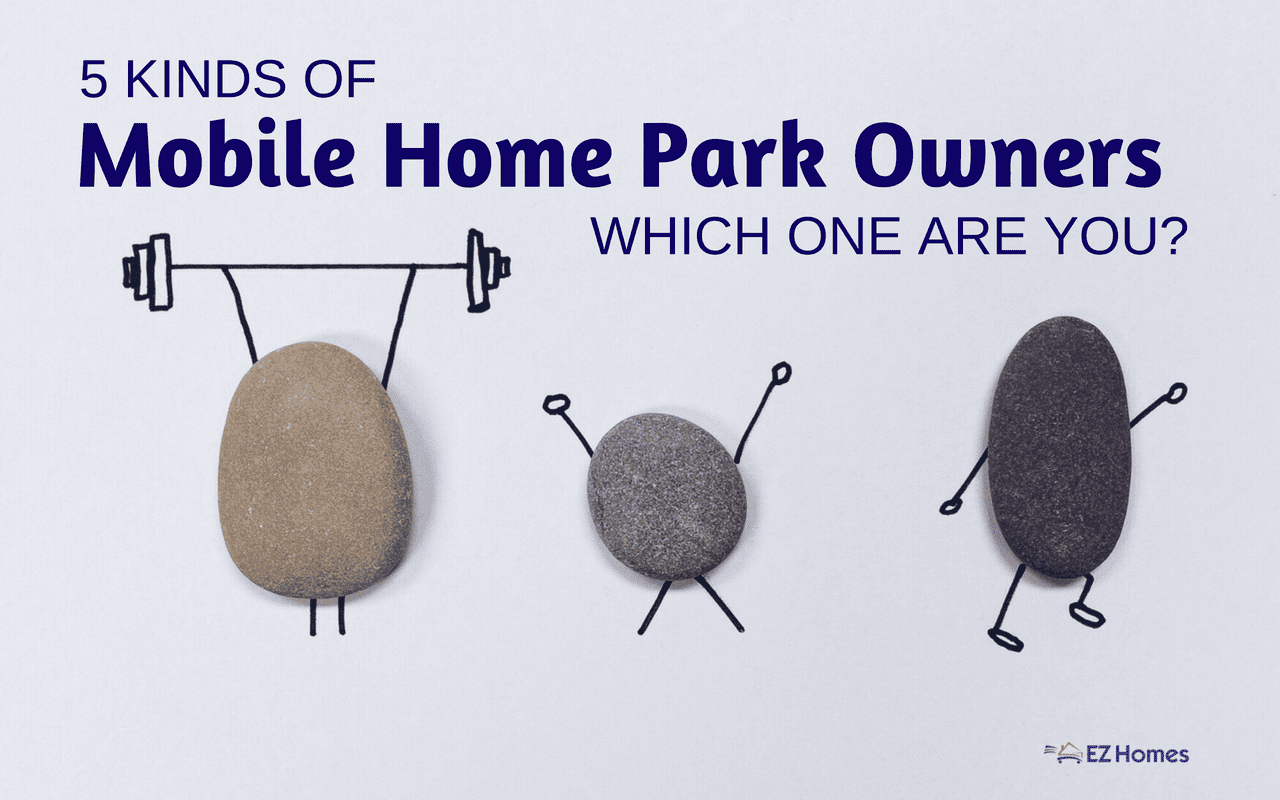There’s no one way to run a mobile home park. Not only do different parks require different things from their owners, managers or landlords, but individuals also bring their own style into the mix. Your method of ownership or management can dramatically influence your experience and success.

Hopefully, you can either identify yourself in this article or find an archetype that suits you. We have made this information functional and actionable by including the unique challenges and opportunities present for each kind of mobile home park owner.
The live-in manager
When you looked at a mobile home park, you saw much more than an income. You saw a place where you could live long-term in a community whose condition you have a personal stake in. As a live-in mobile home park manager/owner, you have the unique opportunity to be a community leader, have a full-time job, and have “free” accommodation for as long as you wish. All in one.
Hopefully, you are also not someone who shirks at taking on new responsibilities, learning new skills, and being on call at odd hours. A mobile home park manager job can be equal parts rewarding and demanding. You need to be well-versed in multiple disciplines that will require you to help fix plumbing issues at one moment and then play accountant the next.
Once you own a large enough park, you might need to enlist some help in the form of a dedicated maintenance manager, landscaper, and an accountant. Live-in couples are popular choices as mobile home managers because you have two pairs of eyes, hands, and ears to take care of the park. If you are living solo, an assistant manager is a good idea, especially if you plan on taking any holidays.
Perks that go beyond money
However, a mobile home park has so much more to offer than a good income. Mobile home parks are usually located on the outskirts of city zones, bringing you closer to nature and providing a slower pace of life.
The current housing crisis, as well as the slowly changing perception of mobile homes, also means that they are becoming real communities that provide the opportunity to live in a family home, with a lawn, and with like-minded neighbors. The quality of mobile homes (officially manufactured homes) have also drastically improved, providing a quality of living identical to real estate.
Challenges
- Managing a mobile home park requires strengths in a number of disciplines that require skills when working with practical or people problems.
- The immense responsibility involved with managing a mobile home park that never switches off (even on vacation).
Opportunities
- The ability to live in your community for free that you can mold to perfection.
- The amazing investment opportunity and potential income that’s possible with mobile home parks.
The long-term investor
Unfortunately, when many people hear the phrase “mobile home park,” they instantly conjure up images of trailer home parks of the past. This distant memory still somewhat smears the perception of mobile home parks as viable investments to this day.
However, an investor’s most important trait is to be able to spot an opportunity a mile away. Currently, mobile home parks provide prime investment opportunities for multiple reasons. The fact that less and fewer parks are being built, also means that it’s a golden window of opportunity that will only be open so long.

The live-in managers who we describe above, find appeal in running a mobile home park for reasons other than its money-generating power. However, for you, this is your only concern. You will be glad to know that, when run by an able manager, mobile home parks can quickly increase their ROI.
Mobile homes that are still run by mom-and-pop owners for the last 20 years usually have plenty improvements that can be implemented quickly, easily, and cheaply. Rents are often years behind and can be brought up to date, unreliable tenants replaced with reliable ones, and empty lots filled.
You have to do what works best for you as well
As someone who values your time, you want your investment to work for you and not the other way around. However, running a successful mobile home park is a full-time job that requires your attention in a number of fields. That’s why you recognize the need to hire a capable and dependable mobile home park manager.
From off-site, you provide supervision, oversight, and direction to make sure they don’t start slipping in their duties. This way, you have just acquired a money-making machine to supplement (or replace) your income into retirement and beyond.
Challenges
- A shrinking window of opportunity as fewer parks are being built and prices increase.
- Older or neglected parks might need a lot of TLC to get up to scratch.
- You need a very strong, reliable, and dependable management team.
Opportunities
- If you manage to find a park to invest in, the shrinking window of opportunity means the value will only go up.
- Parks can be acquired at a much lower cost than real estate developments.
- Mobile home parks typically have higher ROIs that quickly peak as a result of their relatively low running costs.
The DIY-er
Usually, this forms a subset of the “live-in manager” archetype. If you are one of these mobile home park owners, chances are you saw something special in a park that was in less-than-stellar condition. Where others saw an insurmountable mountain peak, you saw a glorious opportunity to turn it into something special. The fact that you could attain it at a much lower price helped too.
Many mobile home parks find themselves in this condition as mom-and-pop owners have owned them for some time. These owners do not always follow through with all the TLC a mobile home park needs over the years, leaving them slightly worse for wear. However, like any precious gem, you can dispose of the grime to reveal the real beauty underneath.
Being a DIYer does add value to your mobile home park
You know everything there is to know about the maintenance required for a mobile home as well as a working knowledge of how utilities function. Once it is in your hands, this will help you dramatically increase the value and appeal of the park. Moreover, it will also prove priceless in the future.

Mobile homes might require slightly more frequent maintenance than real estate. However, they make up for this by being much cheaper, easier, and quicker to maintain. If you can quickly take care of small problems on your own, you will be able to save money. Additionally, you’ll better uphold the integrity of the units in your park.
Challenges
- Unless we are talking about very small parks, it will most likely be virtually impossible for you to handle all the maintenance and DIY needs without outside help.
- Owners are often better off focusing on the financial health of their park than the physical condition.
Opportunities
- Mobile home park residents will appreciate a helpful and capable landlord.
- A new mobile home park can often see a significant increase in value with some initial TLC.
- Being able to attend to small problems yourself will save you money and your residents discomfort.
The socialite
This is the kind of mobile home park manager every tenant dreams of having. You know the names of everyone, their spouses, and kids as well as their pets that live in your park. Instead of feeling a moment of panic when they see you (we all know that feeling when a police officer stops behind you at a light), residents smile and wave excitedly.
You frequently check in with your residents as a form of courtesy and not just to ask them when they are paying their rent or to check up on the unit. Knowing that maintaining a friendly, inclusive, and smooth running community takes everyone pitching in on their end. As such, you keep tenants involved with community meetings and discussions. And you take care to make the most important decisions with community support.
Between the carrot and the stick, you definitely prefer to bring out the best in your residents using positive reinforcement. You figure that losing a bit of money by taking a softer approach is worth what you gain in respect from the community and keeping things cordial.
Challenges:
- There’s a fine line between being amiable and a pushover. You don’t want to be your residents’ “friend”. This will leave you open to manipulation and emotional blackmail.
Opportunities:
- Mobile home parks are becoming the easiest way for people to experience real community-living and most will appreciate a warmer approach.
The drill sergeant
You run a tight ship and boy, do your tenants know that it’s in their best interest to tow the line! Sometimes, the only way to keep a complex and multifaceted operation like a mobile home park in check is to guide it with a disciplined and steady hand. Showing just a single sign of weakness can haunt you in the future. Eventually, everyone will come expect leniency or slowly lose their concern for the consequences of their actions.
Although the mobile home park residents might not always like you, few people can blame you for taking a hard stance. We’ve all heard the horror stories of tenants who make the lives of their landlords difficult once they have a hold.
Hopefully, you tow the line when it comes to the law. Not doing so, only opens you up to challenges if things get ugly and cast a shadow on your side of the story. Specific procedures have been put in place and prescribed to protect both landlords and vulnerable tenants. If you have followed them and have a valid issue with your tenant, you shouldn’t have much to fear.

Being aware of a number of regulatory frameworks:
- The Fair Housing Act: This document describes the basis under which you are allowed or not allowed to discriminate against potential or existing tenants. For example, it states that you may not refuse tenancy based on race, religion or the fact that they have children.
- Follow eviction procedures: It may seem unfair, as a landlord, that you need to make a case to remove someone from your property. However, see it from the side of the tenant and his or her family that could be out on the street at the whim of their park manager. Always document infractions, provide tenants with warnings/notices, and comply with the notice of eviction periods.
- The Manufactured Home Landlord Tenant Act of your state: This document helps to inform landlords of what demands, restrictions, and rules they are allowed to enforce for their park. This document is especially handy when drafting a legally valid lease agreement. It covers anything from park rules, deposits and payments, and even the future of the park.
Challenges:
- It can be very hard to enforce rules across a whole mobile home park.
- Just like with any property, tenants are afforded a certain amount of protection from their landlords.
Opportunities:
- Despite stereotypes, most mobile homeowners are reliable, community-aware, and dedicated tenants.
- While the law does protect tenants to a certain extent, it does empower landlords with a good agreement in place and who follow protocol.
There are many kinds of mobile home park owners, which one are you?
Did you manage to spot yourself among one of these possible kinds of mobile home park owners? If not, what’s your management style? Can you improve on it by adopting one of the archetypes we have described? How about taking the best traits of each (where possible) and fusing them into one super mobile home park manager?
We’ll stress it one more time. Ultimately, there is no right way to run a mobile home park. However, there are a lot of wrong ways. No one is perfect, and that extends to mobile home park owners. The key is to be aware of your challenges and opportunities ahead of time and knowing where to improve. To find out more about the types of ways in which you can own a mobile home park, read our guide here.


